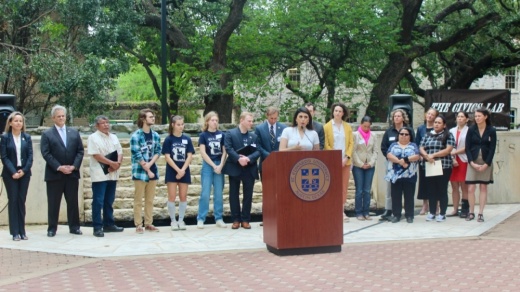City Council is calling on Capital Metro to promote information and access to healthy food options near transit routes as officials highlight the issue of food insecurity in Austin.
A resolution sponsored by District 2 Council Member Vanessa Fuentes and unanimously approved April 21 asks the regional transit agency to consider actions that would help riders find and access grocery stores, markets, and other locations offering healthy and affordable food. The resolution was crafted in part based on food insecurity research by students in The Civics Lab at St. Edward’s University who advocated for council action on the topic.
Officials said the measure was also prompted by the presence of more than 30 food deserts—areas where a large share of the population lives more than a half-mile from a grocery store—and other inequities related to food access in Austin. The item was accompanied by a council proclamation naming April 21 as Food Insecurity Awareness Day.
“Too often when we talk about who is affected by disparity of this nature, we are talking about low-income communities of color. And we already suffer disproportionately with the crushing effect of the severe affordable housing crisis, displacement and gentrification,” District 2 Council Member Pio Renteria said at a press conference. “Like those other issues, access to healthy food is far from an issue of convenience. It’s an issue of equity and of economic justice.”
The council-approved measure will see the city ask CapMetro to update its transit maps, mobile app and website with the locations of places such as grocery stores, markets and food pantries. The updates could also include enrollment options for the Supplemental Nutrition Assistance Program.
The resolution starts the process of revising the Austin Strategic Mobility Plan with new action items for collaboration between the city and CapMetro as well. One could result in expanded bus services linking food-insecure residents with grocery stores, and the other could prompt audio and visual notices for bus passengers when arriving near a grocery store.
Additionally, city staff are directed to complete a new assessment of a strategy to connect more food deserts with locations offering healthy food.
“As prosperous as a community as we are, we still have food deserts in Austin. There’s still ZIP codes in this city that do not have access to a nearby grocery store—in some cases, families having to go more than 20 minutes to get to a nearby grocery store. So there’s certainly a need,” Fuentes said.
Fuentes’ proposal passed with an amendment from District 6 Council Member Mackenzie Kelly aimed at specifically supporting children in food-insecure households. Kelly’s addition asks CapMetro to consider mapping all Austin-area schools that provide certain meal options for students in need.
“As I am well aware from living and growing up as a student who utilized free and reduced lunch meal programs, the effects of food insecurity on children and families spill into their everyday lives—including time spent at school, work and their overall health. Individuals living in food deserts tend to have lower levels of education, earn lower incomes and are more likely to be unemployed,” Kelly said before the item’s passage.
Updates on all components of the resolution are expected from city staff within three months. In a statement, Capital Metro said it will work with the city on rolling out the proposed access and informational updates.
"We value our partnership with Council Member Vanessa Fuentes and appreciate all the hard work from the St. Edwards students. We share their passion about the importance of healthy food access, which is why we recently transferred one of our vehicles to the Central Texas Food Bank that will be transformed into a mobile grocery store. We look forward to continued collaboration with our City partners as they work to implement Council's direction," spokesperson Tawaun Cole said in an email.





